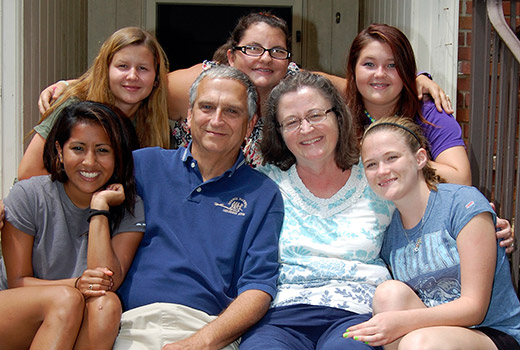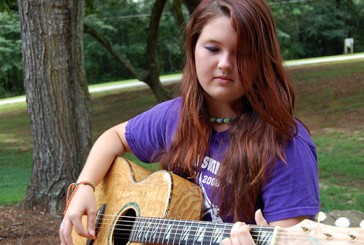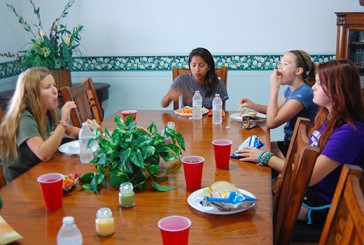When the girls from Brown Cottage at Connie Maxwell Children’s Home go out to eat, they link pinkie fingers and ask the blessing. The endearing ritual, which they call “praying the Brown way,” was started by a girl who lived at the cottage several years ago.
“Praying the Brown way” has become a family tradition, say house parents Dennis and Deborah Erskine, who strive to make life at the cottage a real family experience for the teenage girls who call it home.
“I get attached, and the girls get attached,” said Deborah. “They will tell you we are family. We recognize that we all have our own families, but when they come into our cottage, we really do become a family. They’re always in my mind, even when I’m not there.”
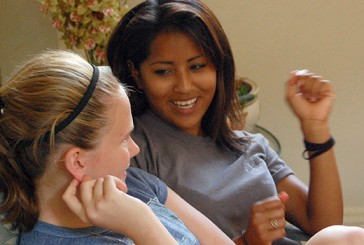
When teenage girls become residents of Brown Cottage, they “really do become a family,” says house mother Deborah Erskine.
Pictures of the girls hang on the walls alongside photos of the Erskines’ daughters. The girls of Brown Cottage help plan each other’s birthday parties. They play video games, or team up for an impromptu duet of “Heart and Soul” on the living room piano. They have a lunch of sandwiches and Doritos at the dining room table and laugh while telling the story of “Papa” Dennis dressing up like a teddy bear at last year’s fall carnival. When Valentine’s Day rolls around, Dennis makes sure to have enough candy bars for everyone. Deborah finds time to give the girls individual attention; one way is to take them individually to the Starbucks in town for a smoothie and a conversation. Recently, when the Erskines were talking through plans to schedule siblings and nieces to help Deborah’s aging parents with yard work, the girls in the cottage asked if they could be a part of the work crew. “They saw it as an extension of their family,” Deborah said.
The girls who live at Brown Cottage are no different from other girls their age. They go to public school. They have house chores as well as job responsibilities on campus. They have structured study times, but they also have time to pursue their own interests. Lexii enjoys hanging out with friends. Tiffany likes to play basketball. Jessica is into scrapbooking, and Marie, a musician, plays guitar and piano. Summer, the newest resident, enjoys exercising. Victoria likes riding horses at the campus farm.
If they aren’t lounging and chatting on the sun porch just off the kitchen, one might find the girls, who range in age from 15 to 17, in another of their favorite places: plopped down in a circle on the floor of Dennis and Deborah’s bedroom, dissecting the day’s events.
They have fun together, but there is also the typical teenage “drama,” says Deborah — just as there is in any family.
They worship together at Connie Maxwell Baptist Church. “Sometimes I’ll ask them what they got out of the pastor’s sermon,” said Dennis, “and I’ll get eight different responses.”
Also, “just like a family, you try to take advantage of teachable moments if a kid is sick, or if she broke up with a boyfriend or if there’s something going on with their [birth] families,” said Dennis. “You help them work through things.”
As many as eight girls can live in the cottage. (Currently there are six.) Some stay on campus until they graduate from high school; others move on after only a few months. But each girl is there because something is broken in her birth family, and the community of Connie Maxwell Children’s Home becomes her surrogate family.
If Connie Maxwell president Ben Davis had his way, every child in the world would grow up in a loving, caring Christian family. “Unfortunately, society is not such that this can happen,” he said. “There are a thousand reasons why kids come here. Some come because of abuse or abandonment or negligence on the part of the family. Sadly, we’ll sometimes get a child from a rather affluent family that doesn’t have time to take care of their child. We also have some children here whose single parent or grandparent loves them very much and would like to have them at home, but because of health, finances or an absent dad, they can’t take care of the child by themselves.”
The majority of children at Connie Maxwell are there as a result of a private placement, Davis said. Only about 15 percent come by way of social services. “Most of the children who come to us are not bad kids, but they have been traumatized,” he said. “Many have been rejected by somebody, and they come with some tough things to deal with. We counsel them, and most of them bounce back and do fine.
“Our hope, desire and prayer is that something can happen to reunify the child’s family at some point. We know we can’t replace the family, but we know we can be a family for them until their family is either reunited or until they’re out there with families of their own.”
The girls from Brown Cottage and Connie Maxwell’s other group homes are members of what Davis calls “South Carolina’s largest family.” No other children’s home in South Carolina has more privately placed children in residence. Connie Maxwell serves about 200 boys and girls each year at its main campus in Greenwood and through satellite locations across the state.
In addition to its traditional residence program for children, Connie Maxwell has introduced two new programs in recent years designed to support families. The Family Care program provides assistance to single mothers who are “motivated to take care of their kids” by offering them an opportunity to live with their children in Connie Maxwell housing while the mother takes advantage of career counseling, job training and education services offered or arranged by Connie Maxwell. “We’re helping to keep the mother and kids out of the DSS system and keep them together as a family unit,” said Davis.
Connie Maxwell also offers help to grandparents who are the primary caregivers for their grandchildren. Davis said there are more than 53,000 grandparents caring for grandchildren in South Carolina. “We tell the grandparents we’ll work with them any way they want — they can have their grandchildren weekends, once a month, summertime — whatever works best for them. Rather than bring the child in [as a full-time resident], we’re allowing that grandparent to remain a vital part of the child’s life.”
More than 16,000 children have come through the doors of Connie Maxwell in the 121 years since it was founded in 1892. Upwards of 600 “alumni,” many of whom unabashedly claim Connie Maxwell as their home, make their way back to campus every two years for a mass reunion weekend. “As soon as you see the alumni and shake their hands, big tears come into their eyes,” said Davis. “They say, ‘I’m back home. All my brothers and sisters are here.’ ” Increasingly, alumni find each other on Connie Maxwell’s Facebook page, which has grown to more than 2,000 friends, the vast majority of whom are alumni.
Davis, a former “newspaper and radio man” and mayor of Fountain Inn, said he fell in love with Connie Maxwell the first time he saw it after he was named a trustee by the South Carolina Baptist Convention. Later, when he was offered a position on staff, “all the doors seemed to open up.” Twenty years ago, he and his wife Polly “came here feeling called to this ministry, and we still feel that call,” he said.
“When I see that sparkle in a child’s eyes or see them turn their life around, or see them going to church on Sunday morning and saying — without us pushing our faith down their throats — that they want to accept Christ … those are the things that make you say, yes, I was called to serve here, and I’m called to stay here.”
Davis expects the house parents of Connie Maxwell, those pivotal caregivers who live with the children day in and day out and share in their most unguarded moments, to have experienced that same kind of calling. “We hire Christians who truly care about kids,” he said. “This couple, Dennis and Deborah — their heart is here. It’s all they want to do.”
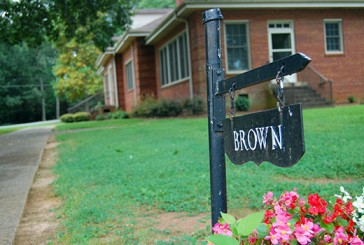 “God called us to do this,” Deborah affirmed. “Of anything I’ve ever done, the most rewarding thing has been living in the cottage and working with the girls.”
“God called us to do this,” Deborah affirmed. “Of anything I’ve ever done, the most rewarding thing has been living in the cottage and working with the girls.”
Dennis said something that really makes him feel good is when a former resident comes back to visit. “The thing you always hear is, ‘This is where I grew up. This is my home.’ ”
For Dennis and Deborah Erskine, making Connie Maxwell feel like home is simply what they do. It’s the Brown way.
